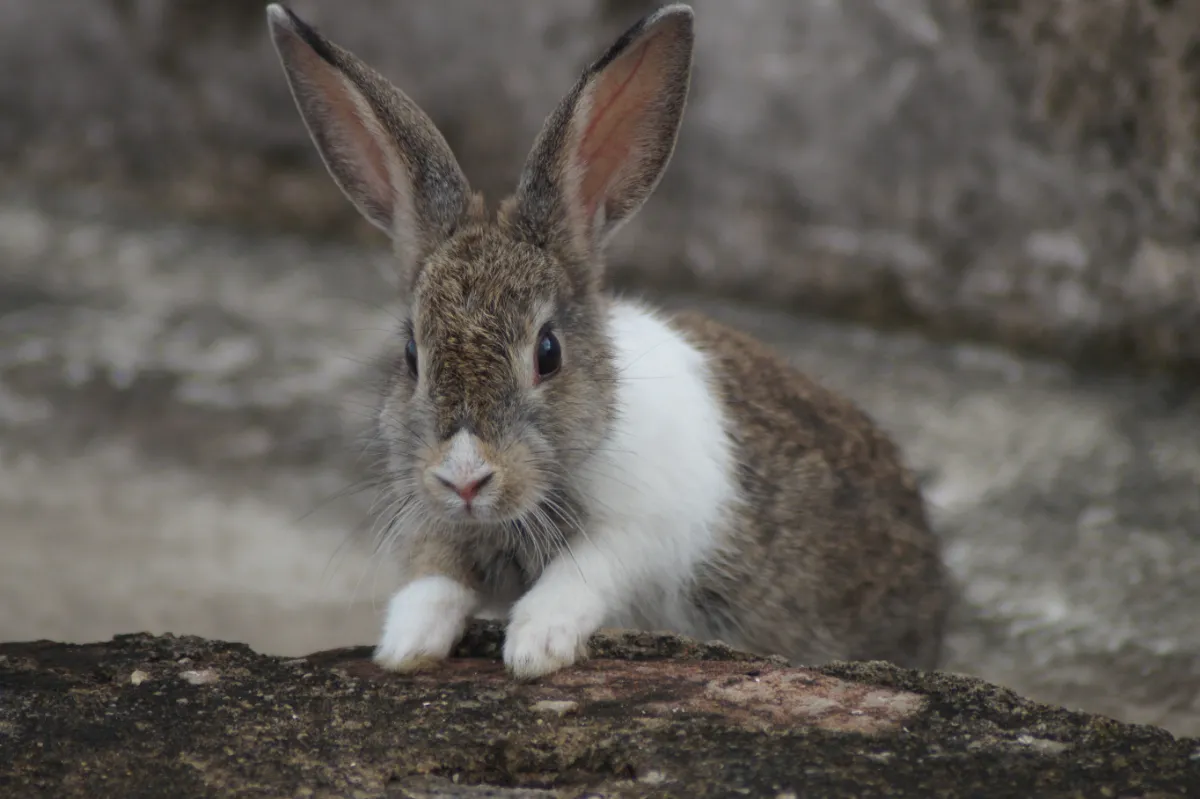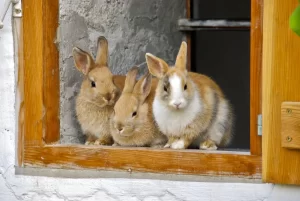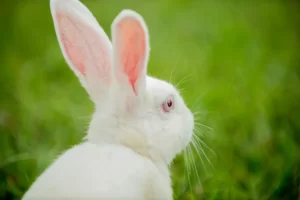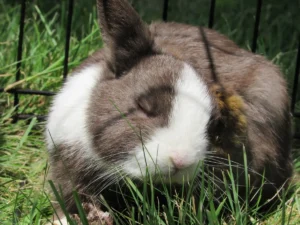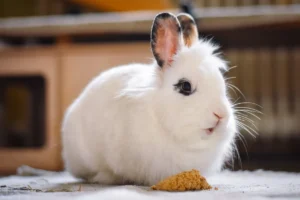Are you wondering why your rabbit is eating his poop? It may seem strange, but there’s actually a scientific explanation behind this behavior.
In this article, we’ll explore the reasons why rabbits engage in coprophagy, whether it’s normal or abnormal, and the nutritional factors involved.
We’ll also discuss the evolutionary perspective and potential health risks associated with poop consumption.
Stay tuned to learn how to manage this behavior and when to seek veterinary advice.
In This Article
- 1 Key Takeaways
- 2 The Science Behind Coprophagy
- 3 Normal or Abnormal: Understanding Rabbit Behavior
- 4 Nutritional Reasons for Poop Consumption
- 5 Coprophagy in the Wild: An Evolutionary Perspective
- 6 Health Risks and Concerns Associated With Coprophagy
- 7 Coprophagy in Baby Rabbits: Is It a Cause for Concern
- 8 Managing Coprophagy: Tips and Tricks
- 9 When to Seek Veterinary Advice for Coprophagy
- 10 Frequently Asked Questions
Key Takeaways
- Coprophagy is a normal behavior in rabbits and serves a vital purpose in their digestive system.
- Rabbits re-ingest cecotropes to obtain essential nutrients, maintain a balanced diet, and foster a healthy gut microbiome.
- Coprophagy facilitates social bonding within rabbit groups or pairs and is also observed in maternal care.
- While coprophagy can transmit harmful bacteria and parasites, proper hygiene and a balanced diet can help mitigate health risks.
The Science Behind Coprophagy
Do you know the reasons behind your rabbit’s coprophagy? Coprophagy is a common behavior in rabbits, and while it may seem strange to us, it serves important purposes for their health. Understanding the benefits and potential risks of coprophagy can help you provide the best care for your furry friend.
Rabbits practice coprophagy to gain vital nutrients that their initial digestion may have missed. When rabbits eat their soft, partially digested feces, known as cecotropes, they absorb essential vitamins, minerals, and proteins that are produced by beneficial bacteria in their cecum. This process is crucial for their overall health and helps them maintain a balanced diet.
However, there are potential risks associated with coprophagy. If rabbits are unable to consume their cecotropes due to a poor diet or gastrointestinal issues, they may suffer from nutrient deficiencies or digestive problems. It’s important to ensure that your rabbit’s diet is rich in fiber and that they have access to fresh hay at all times.
Normal or Abnormal: Understanding Rabbit Behavior
Have you ever wondered if your rabbit’s coprophagy is normal or abnormal, and what factors contribute to their behavior? Understanding rabbit behavior, particularly their social interactions and communication cues, can shed light on this peculiar habit. Here are three key factors to consider:
- Nutrient absorption: Rabbits have a unique digestive system that requires them to re-ingest certain fecal pellets, known as cecotropes, to obtain essential nutrients like vitamins and proteins.
- Social bonding: Coprophagy also serves as a social behavior among rabbits, facilitating bonding within a group or pair. By engaging in mutual grooming and sharing cecotropes, rabbits strengthen their social connections.
- Maternal care: Mother rabbits consume their young’s feces during the first few weeks of their lives. This behavior not only keeps the nest clean but also helps foster a healthy gut microbiome in the kits.
Understanding these factors can help you determine whether your rabbit’s coprophagy is part of their normal behavior or if there might be an underlying issue that needs attention.
Nutritional Reasons for Poop Consumption
Are you aware of the nutritional benefits that come from your rabbit consuming their own poop? While it may seem strange and unappetizing, coprophagy, the act of eating feces, is a natural behavior for rabbits and serves a vital purpose in their digestive system.
Through coprophagy, rabbits are able to extract additional nutrients from their food and maximize their digestion efficiency. This behavior is particularly important for rabbits, as they have a unique digestive system that relies on the fermentation of fiber-rich foods.
By consuming their own poop, rabbits are able to re-ingest fiber-rich cecotropes, which are nutrient-dense and contain essential vitamins, proteins, and beneficial bacteria. To help you better understand the benefits of coprophagy, here is a table summarizing the nutrients found in cecotropes:
| Nutrient | Function |
|---|---|
| Vitamins | Support overall health and metabolism |
| Proteins | Aid in tissue repair and growth |
| Beneficial Bacteria | Assist in digestion and maintain gut health |
Coping with coprophagy involves understanding that it is a normal behavior for rabbits and ensuring they have a balanced diet that includes plenty of fiber-rich foods. Additionally, providing a clean and spacious living environment can help reduce the need for rabbits to consume their own feces.
If you have concerns about your rabbit’s coprophagy, it is always best to consult with a veterinarian who can provide personalized advice and guidance. Remember, serving your rabbit’s nutritional needs is crucial for their overall well-being.
Coprophagy in the Wild: An Evolutionary Perspective
Have you ever wondered about the evolutionary reasons behind coprophagy in the wild? It may seem like a strange behavior, but there are actually several evolutionary advantages to this peculiar habit.
Here are three reasons why animals engage in coprophagy in the wild:
- Nutrient acquisition: By consuming their own feces, animals are able to extract any undigested nutrients that may still be present. This allows them to maximize their nutrient intake and increase their chances of survival in environments where food resources are scarce.
- Gut microbiome maintenance: The gut microbiome plays a crucial role in an animal’s overall health and digestion. Consuming feces helps replenish and diversify the microbial community in the gut, promoting a healthy balance of bacteria and aiding in digestion.
- Parasite control: Some parasites, such as roundworms, have complex life cycles that involve passing through the digestive tract. By consuming feces, animals can interrupt this cycle and reduce their risk of infection.
Understanding the evolutionary advantages of coprophagy sheds light on the importance of this behavior in the wild. It serves as a reminder that nature has its own mechanisms for survival and adaptation, even if they may seem strange to us.
Health Risks and Concerns Associated With Coprophagy
You should be aware of the potential health risks and concerns associated with coprophagy, as it can lead to the transmission of harmful bacteria and parasites.
Coprophagy, the act of eating feces, is a common behavior observed in many animals, including rabbits. While it may seem unappealing, there are reasons behind this behavior.
For rabbits, coprophagy serves a nutritional purpose. Their digestive system is designed to extract the maximum amount of nutrients from their food, and by consuming their own feces, they’re able to reabsorb essential vitamins and minerals that weren’t fully absorbed during the initial digestion process.
However, there are health risks involved. Feces can contain harmful pathogens, such as E. coli and parasites like coccidia. These can lead to digestive disturbances and potential infections. Therefore, it’s crucial to ensure a clean and hygienic environment for your rabbit to minimize the risk of disease transmission.
Coprophagy in Baby Rabbits: Is It a Cause for Concern
Is coprophagy in baby rabbits a cause for concern?
When it comes to the nutrition and development of baby rabbits, coprophagy, or the consumption of their own feces, is a natural behavior. While it might seem alarming, it serves an important purpose in their digestive system development.
Here are three reasons why coprophagy isn’t a cause for concern:
- Nutrient absorption: Baby rabbits have a delicate digestive system that’s still developing. By consuming their soft fecal pellets, known as cecotropes, they’re able to absorb essential nutrients, such as vitamins and proteins, that weren’t fully digested during the first pass through their digestive tract.
- Microbial balance: The cecotropes also contain beneficial microorganisms that help maintain a healthy gut flora. By eating these pellets, baby rabbits establish a balanced microbiome, which is crucial for their overall health and well-being.
- Maternal influence: Mother rabbits play a significant role in teaching their offspring to engage in coprophagy. By observing and imitating their mother, baby rabbits learn the importance of this behavior for their own digestive system development.
Managing Coprophagy: Tips and Tricks
To effectively manage coprophagy in your rabbit, try implementing a combination of dietary adjustments and environmental enrichment. Coprophagy, or the consumption of feces, is a common behavior in rabbits that serves a purpose in their digestion. However, excessive coprophagy can indicate an underlying issue that needs to be addressed. By focusing on managing your rabbit’s dietary habits, training, and behavior, you can help reduce coprophagy and promote a healthier lifestyle for your furry friend.
One approach is to ensure that your rabbit is receiving a balanced diet rich in fiber, as this can help regulate their digestive system. Additionally, providing environmental enrichment, such as toys and hiding spots, can help distract your rabbit from engaging in coprophagy. Remember to consult with a veterinarian for specific dietary recommendations and to rule out any underlying medical conditions that may be contributing to this behavior.
| Dietary Adjustments | Training | Environmental Enrichment |
|---|---|---|
| Increase fiber intake | Teach “leave it” command | Provide toys and hiding spots |
| Offer hay and fresh greens | Reward desired behavior | Create a stimulating environment |
| Limit processed foods | Consistency and positive reinforcement | Rotate toys regularly |
| Consult with a veterinarian | Utilize clicker training | Encourage physical activity |
When to Seek Veterinary Advice for Coprophagy
If your rabbit’s coprophagy persists despite dietary adjustments and environmental enrichment, seeking veterinary advice is recommended. While coprophagy, or the consumption of fecal matter, is a normal behavior in rabbits, excessive or persistent coprophagy may indicate an underlying health issue or nutritional deficiency. Here are three reasons why veterinary intervention may be necessary:
- Health concerns: Your veterinarian can perform a thorough examination to rule out any health problems that may be causing or contributing to the excessive coprophagy. This may include checking for dental issues, digestive disorders, or parasites.
- Nutritional assessment: A veterinarian can evaluate your rabbit’s diet to ensure it’s nutritionally balanced and meets their specific needs. They may recommend dietary modifications or supplements to address any deficiencies that may be triggering coprophagy.
- Behavioral modification techniques: Your veterinarian can provide guidance on implementing behavioral modification techniques to help reduce or manage coprophagy. This may involve environmental adjustments, such as increasing exercise or providing more mental stimulation, as well as training methods to discourage the behavior.
Frequently Asked Questions
Can Rabbits Get Sick From Eating Their Poop?
Rabbits can potentially get sick from eating their poop. While it may seem strange, coprophagy (eating poop) is a natural behavior for rabbits. It helps them obtain essential nutrients and aids in digestion.
How Common Is Coprophagy in Pet Rabbits?
Coprophagy, or the eating of poop, is a common behavior in pet rabbits. It serves a purpose in their digestive health, as it allows them to reabsorb important nutrients. However, it can also have behavioral implications and may require intervention.
Is Coprophagy a Sign of a Nutritional Deficiency in Rabbits?
Eating poop, or coprophagy, is a common behavior in rabbits. It’s not necessarily a sign of a nutritional deficiency. However, ensuring a high-fiber diet can help prevent coprophagy and maintain proper digestive health in rabbits.
Can Coprophagy Be Prevented or Managed Through Diet Changes?
To prevent coprophagy through diet changes, focus on behavioral training and maintaining a healthy gut microbiota. By providing a balanced diet, ensuring adequate fiber intake, and promoting regular exercise, you can help manage this behavior in your rabbit.
Is Coprophagy More Common in Certain Breeds of Rabbits?
Coprophagy, the behavior of eating feces, is observed in rabbits regardless of breed. It is a normal part of their digestive process, allowing for better nutrient absorption. This behavior helps maintain their digestive health.

